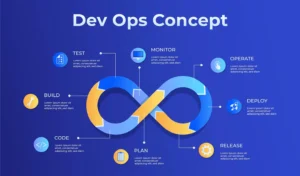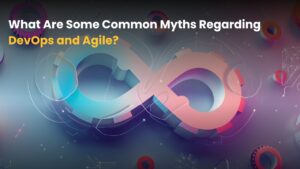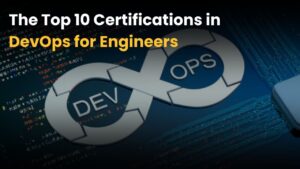Introduction
As technology continues to evolve, so does the practice of DevOps. In 2025, DevOps is no longer just a methodology but an essential part of software development and IT operations. With rapid advancements in automation, AI, and cloud computing, DevOps is transforming to meet the demands of modern enterprises. The major developments, trends, and best practices that will influence DevOps in 2025 are examined in this article.
AI and Machine Learning in DevOps
Software development is a rapidly changing field, and DevOps has become a key methodology for bridging the gap between development and operations. The way software is developed, tested, deployed, and monitored is being revolutionized by the incorporation of AI and ML into DevOps practices.
The Role of AI and ML in DevOps
AI and ML bring automation, intelligence, and predictive capabilities to DevOps workflows, reducing manual intervention and enhancing efficiency. Their role in DevOps can be categorized into several key areas:
1. Continuous Integration and Continuous Deployment (CI/CD)
AI-driven analytics help in optimizing CI/CD pipelines by identifying patterns in build failures, predicting deployment risks, and automating code reviews. ML models can analyze historical data to predict the likelihood of code changes causing issues, enabling teams to take preemptive actions.
2. Automated Testing
AI-powered test automation tools can analyze application behavior, identify redundant test cases, and prioritize testing based on risk assessment. ML algorithms can also dynamically generate and optimize test cases based on previous test results, reducing the overall testing time and improving software quality.
3. Infrastructure Management and Optimization
AI and ML enable intelligent infrastructure management by predicting system failures, optimizing resource allocation, and automating configuration management. AI-driven monitoring tools can detect anomalies in server performance, network latency, and cloud resource utilization, allowing proactive resolution of potential issues.
4. Security and Threat Detection
Security is a critical concern in DevOps, and AI-driven security solutions help in identifying vulnerabilities, detecting unusual behavior, and responding to threats in real-time. ML models can analyze access patterns, flag potential security breaches, and automate compliance checks, ensuring a more secure DevOps pipeline.
5. Incident Management and Root Cause Analysis
AI-powered incident management systems can automatically categorize, prioritize, and resolve issues based on historical data and predefined rules. ML-driven root cause analysis helps in diagnosing issues faster by correlating logs, metrics, and traces from multiple sources, reducing downtime and improving system reliability.
6. Performance Monitoring and Predictive Maintenance
AI-enhanced monitoring tools can analyze vast amounts of data from applications, servers, and networks to detect performance bottlenecks. Predictive analytics can forecast potential failures and suggest preventive measures, thereby minimizing disruptions and ensuring high availability of services.
DevOps Training in Pune provides a great environment to upskills these valuable skills
Key Trends in DevOps for 2025
1. AI and Machine Learning in DevOps
AI-driven automation is redefining how DevOps teams work. CI/CD pipeline optimization, anomaly detection automation, and system failure prediction are all being done with machine learning algorithms. Tools leveraging AI will become more sophisticated, reducing human intervention and improving efficiency.
2. GitOps and Infrastructure as Code (IaC)
The usage of Git repositories as the source of truth for infrastructure and application deployment management, or GitOps, will only grow in popularity. Coupled with Infrastructure as Code (IaC), DevOps teams can ensure consistency, security, and scalability across environments.
3. Shift-Left Security and DevOps
Security is becoming a top priority, leading to the widespread adoption of DevOps. To prevent vulnerabilities and guarantee compliance, teams can incorporate security early in the development process. Automated security scanning tools, policy-as-code, and continuous security monitoring will be crucial in 2025.
4. Hybrid and Multi-Cloud Strategies
Organizations are increasingly adopting hybrid and multi-cloud environments to avoid vendor lock-in and ensure reliability. DevOps practices will need to adapt by integrating tools that provide seamless deployment, monitoring, and scaling across multiple cloud providers.
5. Edge Computing and DevOps
The use of edge computing is growing in popularity as 5G and the Internet of Things expand. DevOps teams will need to manage distributed infrastructure, deploy applications closer to end-users, and optimize performance at the edge while ensuring security and compliance.
Innovations Driving DevOps in 2025
Here are the key innovations driving DevOps in 2025, along with detailed explanations for each:
1. AI-Driven Automation
Complex procedures are being automated by machine learning (ML) and artificial intelligence (AI), which is transforming DevOps. AI-powered predictive analytics help in proactive issue resolution, anomaly detection, and intelligent incident management.
2. GitOps and Infrastructure as Code (IaC) Evolution
GitOps is becoming a standard for managing infrastructure, ensuring consistent, automated deployments through declarative configurations. Advanced IA tools now integrate with AI to optimize infrastructure provisioning dynamically.
3. Platform Engineering & Internal Developer Platforms (IDPs)
Organizations are adopting platform engineering to provide self-service environments for developers. IDPs streamline software delivery by offering pre-configured infrastructure, improving developer productivity and consistency.
4. Cloud-Native and Serverless Adoption
The shift toward cloud-native architectures, including Kubernetes and serverless computing, enhances scalability, cost efficiency, and faster deployments. Innovations in multicloud orchestration are simplifying cross-platform deployments.
5. Security as Code (DevSecOps 2.0)
Security is embedded throughout the DevOps lifecycle, with “Security as Code” automating compliance checks, vulnerability scans, and threat intelligence. AI-driven security tools predict risks and enforce security policies dynamically.
6. FinOps for Cost Optimization
FinOps (financial operations) is becoming essential in DevOps, ensuring cloud costs are optimized by automating resource allocation and cost monitoring. AI-based forecasting tools provide real-time budget insights.
7. Low-Code/No-Code DevOps
The rise of low-code/no-code platforms extends DevOps practices to citizen developers, enabling faster application development and reducing dependencies on specialized engineers.
8. Edge Computing & 5G-Enabled DevOps
Edge computing, combined with 5G, enables ultra-low latency deployments and real-time processing closer to the user. DevOps is evolving to manage edge infrastructure efficiently with automated CI/CD pipelines.
9. Observability and AIOps for Continuous Monitoring
AI-driven monitoring technologies that offer real-time insights into system performance, auto-remediation, and root cause investigation are boosting full-stack observability.
10. Sustainable DevOps (GreenOps)
With a focus on sustainability, DevOps practices now prioritize energy-efficient computing, carbon footprint reduction, and eco-friendly infrastructure choices. GreenOps strategies help optimize workloads for minimal environmental impact.
Best Practices for DevOps in 2025
1. Automate Everything
From code integration to infrastructure provisioning, automation will be the key to achieving efficiency and scalability. Teams working on DevOps should spend money on solutions that minimize human labor and expedite procedures.
2. Embrace Observability
Monitoring alone is no longer enough. Observability—understanding the internal state of systems through metrics, logs, and traces—will be essential for diagnosing and preventing issues in complex cloud-native environments.
3. Adopt a Security-First Approach
Security ought to be included in the DevOps process at every level. Implementing automated security scanning, policy enforcement, and compliance checks will help mitigate risks and enhance resilience.
4. Encourage Collaboration and Continuous Learning
Culture is just as important to DevOps as technologies and procedures, and creativity and efficiency will be fueled by fostering cooperation across development, operations, and security teams and fostering ongoing learning.
Conclusion
The future of DevOps in 2025 is marked by increased automation, AI integration, and a strong focus on security and cloud flexibility. Organizations that embrace these trends and best practices will stay ahead in the rapidly evolving technology landscape. By adopting AI-driven tools, prioritizing security, and fostering a culture of continuous improvement, DevOps teams can achieve greater efficiency, reliability, and innovation in software development and operations.







